CHART LAB PROJECTS

YDI 2024 Provincial Report
In 2024, over 17,000 young people across British Columbia participated in the YDI, representing 31 school districts and 31 independent schools. This report is an opportunity to hear directly from them about the resources, opportunities, and practices needed to support youth well-being.

An Exploration of School-Based Mental Health Promotion Initiatives in British Columbia
This project, supported by the BCCDC, provides a snapshot of mental health promotion, including those related to substance use, in British Columbia (BC) K–12 school communities. The report outlines practitioner reflections and recommendations for school-based mental health promotion in the province.
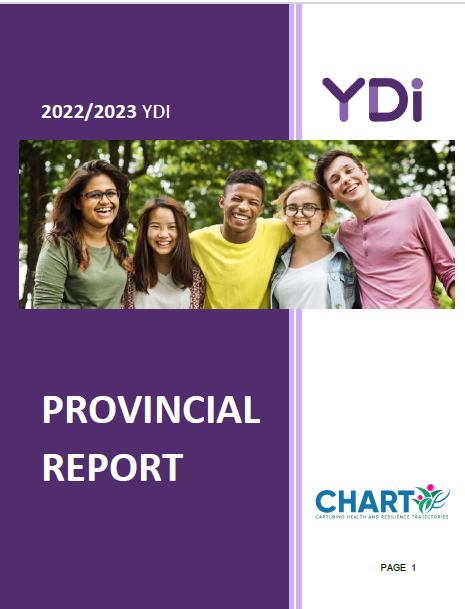
YDI 2023 Provincial Report
This Provincial Report consolidates results from the Youth Development Instrument (YDI). In 2023, We heard from 14,596 young people in 28 school districts and 28 independent schools across BC. The report includes findings about sleep, physical activity, positive relationships, and other factors that have been linked to young people thriving.

Improving child and youth well-being in the COVID-19 recovery phase in British Columbia
This project, led by Drs. Evelyn Stewart and Hasina Samji, focuses on identifying subpopulations of youth and families who have been at increased risk of poor mental health and well-being during the pandemic, as well as identifying strategies to promote youth mental health and well-being in BC. The project consists of three components: a literature review, two deliberative dialogue sessions, and analysis of two BC-based data sources (the Personal Impact of COVID-19 Study [PICS] and the Youth Development Instrument [YDI]).

Supporting Students During the Pandemic and Beyond: Lessons Learned from British Columbia Administrators of Inclusive Education
Commissioned by the British Columbia Council of Administrators of Inclusive Support in Education (BC CAISE) and with support from the British Columbia Ministry of Education and Child Care, this report explores the barriers facing learners with diverse needs and disabilities throughout COVID-19 but also the strategies and practices school systems have taken to overcome or combat these barriers.
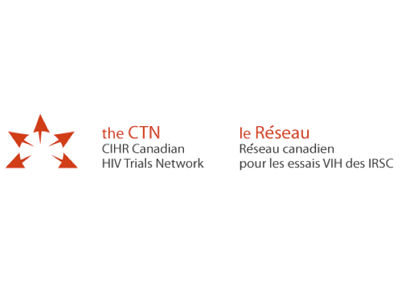
COVID-19 Vaccine Effectiveness Among People Living With HIV
Dr. Samji is co-leading a new pandemic-related study comparing vaccine effectiveness in people living with HIV and those who do not. Researchers will follow 35,000 people living with HIV in B.C. and Ontario and track the COVID-19 vaccine uptake and rates of SARS-CoV-2 infection and hospitalizations.
The study is part of a larger research initiative called COVAXHIV, the most extensive national study to date to evaluate the immunogenicity, safety and effectiveness of COVID-19 vaccination in a diverse population of people living with HIV. The research is led by the Canadian Institutes of Health Research (CIHR) Canadian HIV Trials Network (CTN) and research collaborators from across Canada.

Impacts of the COVID-19 Pandemic on the Health and Well-Being of Young Adults in British Columbia
Dr. Samji co-led a report through the BCCDC looking at the impacts of the COVID-19 pandemic on young adults. This report was released to inform initiatives and policies already supporting this population as part of the BC government’s planning for the post-COVID-19 recovery.
Read the full report here.

Achieving Mental Health Equity in British Columbia
Dr. Samji collaborated with the BC Alliance for Monitoring Mental Health Equity (BC AMMHE), a coalition of researchers established during the COVID-19 pandemic to advance mental health equity. In Summer 2023, BC AMMHE released the report ‘Achieving Mental Health Equity in British Columbia,’ which outlines seven key recommendations for enhancing mental health equity in the province.
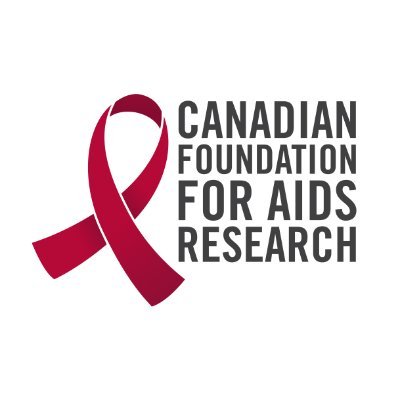
Characterizing the Burden of Mental Illness Among People Living with HIV
Watch Dr. Samji’s conversation with CANFAR CEO, Alex Filtreatu, on how this research can inform decesion-making and pratices for providing care and resources to people living with HIV and mental illnesses.
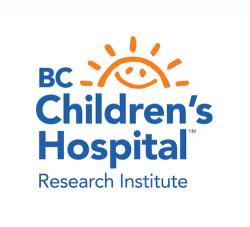
COVID-19 Survey (PICS) Study
Co-led by Dr. Evelyn Stewart, the coronavirus disease (COVID-19) pandemic has had major impacts on the personal lives of Canadian children, youth and adults. Direct effects like infections and hospitalizations dominate news headlines. But less is known about the thoughts, feelings and actions of people living through this pandemic. We are interested in learning about these impacts, and about which resources and services have been most helpful over time. This information can then be shared with government and health leaders to address immediate needs and prepare for future potential waves or pandemics.
Please click here to learn more: http://www.bcchr.ca/POP/our-research/pics
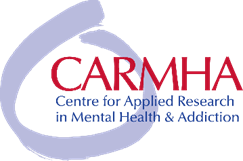
Centre for Applied Research for Mental Health and Addicitions (CARMHA)
CARMHA is an internationally recognized research centre based within the Faculty of Health Sciences at SFU. CARMHA conducts innovative and interdisciplinary scientific research related to mental health and substance use, primarily in the areas of clinical or other intervention practice, health systems and population health and epidemiology.
With a focus on knowledge translation and policy and practice development, CARMHA’s primary mission is to conduct research, generate evidence, and translate knowledge into policy and practice that is innovative, relevant and effective in preventing and reducing the burden of disease related to mental health and substance use.
Dr. Samji led the BCCDC contributions for these projects:
This 12 month study is the first phase of a broader effort to support evidence-based planning for mental health and substance use services in the province. Initiated by the British Columbia (BC) Ministry of Health (MoH) with the support of the Michael Smith Foundation for Health Research, the study will provide the MoH the most up to date epidemiological prevalence and distribution estimates of adults in BC for selected mental disorders and substance use disorders.
The following methods will be applied and cross validated:
- Determination of epidemiological findings based on existing scientific literature
- Analysis and examination of existing survey data
- Analysis and examination of relevant administrative data (derived from existing BC health services)
Future phases of this work will develop evidence-based needs estimates to assist provincial planning and contribute to efforts that aim to strengthen the mental health and substance use system of care in BC.
Building off of the work completed in Phase 1 of the Prevalence & Distribution Study, this phase will involve: (1) the development of detailed ideal suites of services for thirteen selected DSM-5 disorders, and (2) the integration and sizing of these service suites across a tiered functional framework (accounting for comorbidty).
This second phase is a two-year project (June 2017 to May 2019) supported by the Ministry of Mental Health and Addiction and the BC Mental Health Foundation that aims to provide a comprehensive estimation of mental health and substance use disorder needs for adults in BC.
Featured Publications & Reports:
Identifying Mental and Substance Use Disorders Using Administrative Data

Exploring strategies to promote student happiness and well-being in the classroom
This project primarily supports SFU Health Promotion’s “services and supports” condition for well-being as we provide tips for increasing student happiness and resilience. We have observed high rates of anxiety and depression in undergraduate and graduate classes and would like to provide students strategies to better cope with stress from school and in their lives, borrowing from concepts from positive psychology. The central idea is that happiness can be learned. Drawing from Professor Laurie Santos’s course on the “Science of Happiness,” we hope to measurably increase happiness levels with sustained effects by sharing modifiable factors influencing our happiness with students and how they can intentionally improve their happiness. Ideally the strategies will have ripple effects as students share them with peers. We hope that our focus on student well-being will also contribute to positive classroom culture through my demonstrated emphasis and interest in promoting student wellness and mental health.
Read more here:
http://www.sfu.ca/istld/faculty/grant-programs/projects/WLE/G0415.html
http://www.sfu.ca/cee/news/fostering-connection-and-practicing-kindness.html
Watch Dr. Samji’s and Ladan Fathi’s presentation at the Health Minds Healthy Campuses 2021 Summit:

British Columbia Hepatitis Testers Cohort (BC-HTC)
The British Columbia Hepatitis Testers Cohort (BC-HTC) is a dynamic cohort including all individuals who were tested for the hepatitis C virus (HCV) or human immunodeficiency virus (HIV), or diagnosed with, hepatitis B, hepatitis C, HIV or active tuberculosis since 1990. These data are linked with corresponding data on medical visits, hospitalizations, cancers, prescription drugs, and death records. Various datasets in the BC-HTC data are updated on 6 months to biannual basis. The overall purpose of the BC-HTC is to monitor disease burden related to hepatitis and associated infections and social conditions, evaluate impact of interventions, and monitor hepatitis program progress to inform policy and programming in British Columbia and Canada.
Dr. Samji’s work looks at the burden of mental illness among people living with HIV and HCV. Dr. Samji is a received grant funding through the Canadian Foundation for Acquired Immunodeficiency Syndrome (AIDS). You can hear her recent interview with CANFAR CEO, Alex Filiatrault, here: https://www.youtube.com/watch?v=rZDPryGV9QQ
Featured Publications:
